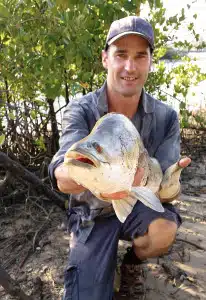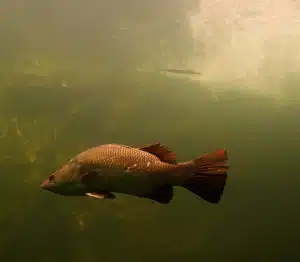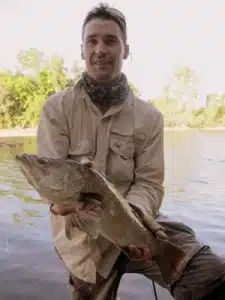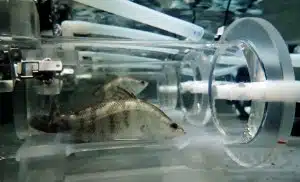
Geoffrey Collins and barramundi, Northern Territory
Barramundi are giving hope to our climate-vulnerable seafood future, with Queensland researchers finding that our beloved fish dinner can show resilience to warmer waters and decreased oxygen levels.
“Warmer water means less available oxygen for breathing, and more energy required to sustain basic bodily functions,” explains Geoffrey Collins, a PhD student at James Cook University and the Australian Institute of Marine Science.
“I’ve found that barramundi can improve their ability to use oxygen over time and thus can cope with, and adjust to, a warmer world with less oxygen,” says Geoffrey.
Oxygen in water is likely to further decrease with the rising temperatures predicted from climate change. However, the main driver of low oxygen in freshwater systems is increasing pressure from human land use, such as farming and the historical loss of wetlands.
“Increasing nutrients from farms and cities can result in more algae and bacteria in the water, which reduces the amount of oxygen available in our aquatic environments.”
Understanding how commercial fish such as barramundi cope with warmer water and less oxygen is essential to ensure that humans can continue to feed ourselves in the future. It’s particularly important where there is a high fish diet, such as in Southeast Asia.
But barramundi need time to adapt to these changing conditions, and aquatic environments, including freshwater and estuaries, can change from having plentiy of oxygen to being critically low in a matter of hours.
“The way fish respond depends on how fast the oxygen is depleted from the water” explains Geoffrey. “Low oxygen negatively affects growth and any sudden reductions in oxygen could be responsible for large-scale fish death, which can occur without much warning .”
Geoffrey hopes that these findings will help produce guidelines for managing freshwater systems and improved management practices for aquaculture to ensure the fish populations can be sustained in the future.
“Fish are an important part of the aquatic food-web, but are also an important source of protein for many people around the world.”
Geoffrey presented his research at Fresh Science North Queensland 2015.
Fresh Science is a national program that helps early-career researchers find and share their stories of discovery. Almost 180 early-career researchers nominated for Fresh Science 2015, and this was the first year it was held in Townsville. Fresh Science North Queensland was held at James Cook University (training) and Molly Malone’s hotel (public challenge event).
Fresh Science North Queensland was supported by James Cook University and the Australian Institute of Marine Science.
Geoffrey Collins, James Cook University and Australian Institute of Marine Science,
+61 747 815585, geoffrey.collins@my.jcu.edu.au








 Fresh Science is on hold for 2022. We will be back in 2023.
Fresh Science is on hold for 2022. We will be back in 2023.